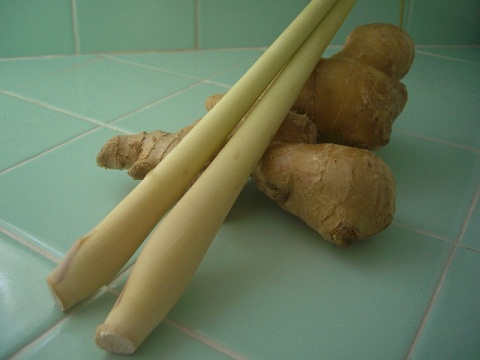

Feeling a little short on cash these days? Plant some ginger in your yard, it will guarantee prosperity. Or maybe you're apprehensive about dragons and serpents? A few stands of lemongrass around your home should effectively repel them. Looking to attract and hold onto a lover? A bath perfumed with lemongrass should do the trick. Or so certain bits of folklore from around the world would have us believe!
Whether or not these tales are true (and I must confess to a slight skepticism), there are other benefits to be derived from these aromatic plants that are quantifiable and demonstrable. And rather than nutritional, the benefits to be found here are largely medicinal, with ginger and lemongrass (also known as "fever grass") proving to be helpful with combating an array of ailments.
Ginger's most prominent effect is gastro-intestinal. Got an upset stomach? Get ginger. Prone to motion sickness? Get ginger. Suffering with nausea from chemotherapy or morning sickness from pregnancy? Get ginger. Studies have proven that the ingestion of small amounts of ginger can eliminate intestinal gas and alleviate multiple symptoms of motion sickness; and because it has no known side-effects, ginger is especially useful for morning sickness in pregnant women, as it poses none of the risks that nausea medicines might create.
And its usefulness doesn't stop there. Ginger contains powerful anti-inflammatory compounds called gingerols. In numerous studies, consumption of ginger has been directly linked to relief from the pain and swelling of various types of arthritis and accompanied by increased mobility. It has also been persuasively suggested in several studies and experiments that gingerols may inhibit the growth of colorectal cancer cells -- and actually cause the death of ovarian cancer cells.
Lemongrass is a bit more modest and mundane in its benefits, but nonetheless helpful. In Ayurvedic medicine, it is used to alleviate coughs and nasal congestion. The essential oil derived from it is used to repel insects, employed in soaps as an antiseptic and applied to the skin to combat fungal infections. A friend of mine who grew up in the deep south informed me that whenever she had a fever as a child, her grandmother brewed a posset of "fever grass" to induce sweating and break the fever.
A recent study also suggests that lemongrass may share a property with ginger: Preliminary findings from research at Ben Gurion University in Israel indicated that in vitro, the active ingredient citral caused the death of cancer cells, while leaving normal cells untouched.
So whether you use them to treat an existing condition, or ward off a potential one, ginger and lemongrass are excellent additions to your culinary health arsenal. Maybe you won't get rich, or find a paramour, or even escape from dragons; but your body will thank you anyway!
The "Other" Ginger
If you're a fan of Asian cooking, as I am, you may have run across a recipe calling for galangal -- probably in a Thai soup or a Malaysian curry. These recipes often tell you that you can substitute ginger for galangal. Well, you can -- they're both in the same family; and that being so, galangal has the same beneficial effects as ginger in terms of intestinal fortitude and other characteristics.
They also look similar, though galangal is paler in hue and harder to cut (so be careful), but the flavor of the galangal is different from ginger -- more complex, nuanced and intriguing. Rather than the aggressive bite of ginger, you'll find a milder heat reminiscent of mustard, with hints of citrus and notes of pine and earth.
So when a recipe calls for galangal, make an effort to find some -- it'll give you a unique culinary treat. Most Asian markets will probably have some on hand, and it makes an awesomely subtle tea, complete with all the health benefits of ginger.
Use the same criteria for selection as you would for ginger: choose tubers that look fresh and tight-skinned (not wrinkled or splotchy) and free of mold; they should be heavy for their size, and have minimal "knobs." Store galangal wrapped in plastic in the fridge for up to two weeks, or in the freezer for up to two months.
Asian Rice Salad
Serve this with shredded lettuce as a light luncheon, or pair with some grilled teriyaki chicken and stir-fry veggies for a satisfying supper.
1 cup organic brown rice
1 cup vegetable broth
1 cup water
1 tablespoon peeled minced fresh ginger
1 teaspoon minced lemon grass, white part only
2/3 cup diced carrots
1/2 cup cooked green peas
1/3 cup sliced green onions
Dressing:
2 tablespoons fresh lime juice
1 tablespoon rice wine vinegar
1 teaspoon sesame oil
2 tablespoons canola oil
1 teaspoon soy sauce
1/2 teaspoon grated lime zest
1/2 teaspoon sambal oelek (hot chili sauce - optional)*
Combine rice, broth, water, ginger and lemongrass in a medium saucepan; bring to a boil, reduce heat and simmer until all liquid is absorbed -- about 40 minutes. Remove from heat, let sit for five minutes and then fluff with a fork. Allow to cool to room temperature, then stir in carrots, peas and green onions.
In a small jar, combine dressing ingredients and shake until well-combined. Transfer rice mix to serving bowl, toss with dressing and serve. (This can also be refrigerated for later use.)
Serves four.
*available at Asian markets and some supermarkets.
Invigorating Thai Iced Tea
1/4 cup peeled fresh ginger, coarsely chopped
1/4 cup diagonally-sliced lemongrass
8 green tea bags
1/4 cup organic honey
1 quart boiling water
1/2 cup lite organic coconut milk
Add ginger, lemongrass, green tea and honey to boiling water and let it steep for 10 minutes. Strain into a large beverage container; stir in coconut milk. Chill thoroughly. Serve over crushed ice with fresh mint.
A version of this post appears in my "Eat Smart" column in the June issue of Better Nutrition magazine.